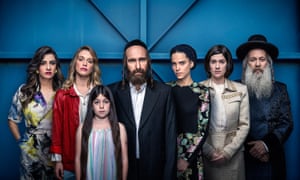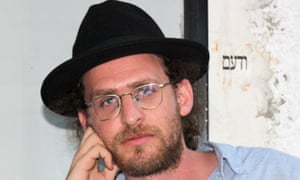Israeli TV show puts wall between secular and ultra-Orthodox Jews
‘This is the reality that currently exists in Israel,’ says the creator of Autonomies
War rages in the heart of the Middle East. Jerusalem is captured. Concrete walls go up, and a deep distrust spreads across the holy land.
The well-worn tale is used as the backdrop to multiple Israeli television dramas. Yet for one show, it is not Arabs and Jews who are doing the fighting, but Jews and Jews.
Currently touring film festivals across the world, the six-part series Autonomies envisions a clash between secular Jews and the deeply religious ultra-Orthodox, or Haredi, Jews.
In this vision, set in the near future, civil war has cut the land into two countries. The coastal State of Israel is nonreligious, with the cosmopolitan city of Tel Aviv as its capital. Jerusalem is a walled, autonomous city-state, run by Haredi rabbis.
At first glance dystopian, the show is in fact an artistic extrapolation of real-life rifts in Israeli society. Many Israelis increasingly see secular-Haredi disaccord about the future of the state as a greater concern than the Palestinian issue, and fear it could tear the country apart from the inside.
Earlier this year, disagreements between secular and religious politicians shattered attempts to form a coalition government and dragged the country into a second round of elections. On 17 September, Israelis will go back to the polls following a campaign in which political parties have sought to exploit internal animosity.
Yehonatan Indursky, an Israeli filmmaker who wrote Autonomies with the writer Ori Elon, says the show takes divisions in Israel “to extremes, and tries to show what can happen if we do not wake up and try to find the way to live together and respect one another’s way of life”.
The drama’s protagonist, Broide (played by Assi Cohen), is a Haredi man who moves contraband, smuggling pornography and books banned by the religious authorities into Jerusalem. He is one of a few who crosses between the two sides and is soon caught up in a controversy that could reignite the war.
The Israeli filmmaker Yehonatan Indursky, pictured, wrote the show with the writer Ori Elon. Photograph: Dpa Picture Alliance/Alamy Stock Photo
The series comes off the back of the writers’ hit Netflix show Shtisel, which received acclaim for sensitively and lovingly portraying Haredi family life, and has been renewed for a third season. Autonomies instead paints a much bleaker scene.
“Autonomies gives a kick in the stomach. And sometimes it is painful and hard to watch,” Indursky said.
What is fascinating for many viewers is how similar the setting of Autonomies appears. Israelis today lament a nation already divided, with the Haredim often living in their own neighbourhoods, women covering their hair with wigs and men wearing black coats and hats.
To secular outcries, ultra-Orthodox politicians have sought to ban public transport and other activities on the Jewish holy day of rest, and outlaw non-kosher food in supermarket chains. They feel their way of life is under threat.
Meanwhile, resentment against them focuses on hefty government stipends given to the community, as many men do not work but study religious texts. Almost half live in poverty.
Indursky grew up in an ultra-Orthodox family in Jerusalem but has not been part of the community for years, although he keeps close links with family and friends. He said he had received two main responses from Israelis to the series, both of which saddened him.
“One possible answer is that this is really not a dystopia but rather a utopia,” he said, adding some viewers backed the idea of separate countries to end seemingly irreconcilable differences.
“The second possible answer is that this is not a dystopia – this is the reality that currently exists in Israel. And in a way, that’s part of what we wanted to show through the series.”
The fissure between secular and ultra-Orthodox communities has already spiralled to the point that it ignited a political crisis this year.
TO CONTINUE READING CLICK HERE.


The ultra-religious – Jewish, Muslim, Hindu, Christian, Buddhist; take your pick – are the same. Intolerant of any who don’t share their world view and desirous of forcing others to conform to their dictates. The mix of religion and politics is toxic. It doesn’t require much of a stretch of the imagination to envision a scenario where the non-Haredi population rises in anger against the minority non-working, non-earning, non-contributory Haredim and breaks their grip on civic life and destroys their institutions. Nobody owes those people a living. Non-Haredim and non-Jews are not chldren of a lesser G-d no matter what the black hats think.
LikeLiked by 1 person